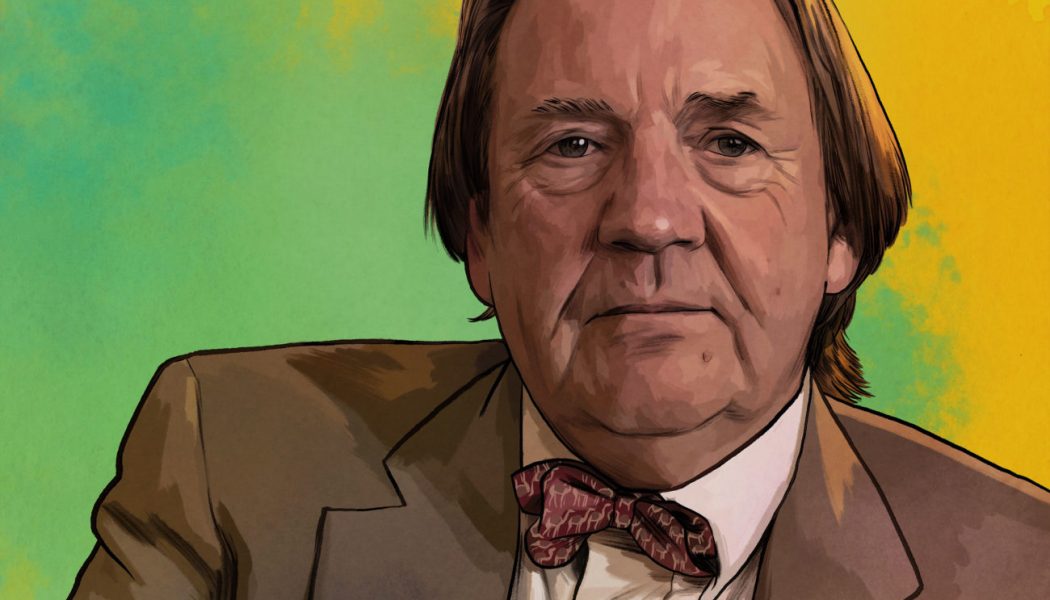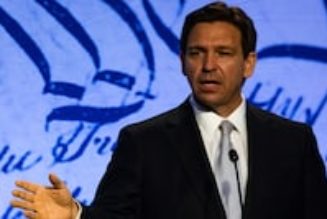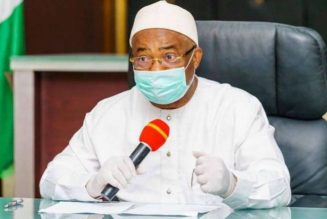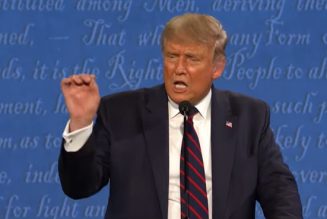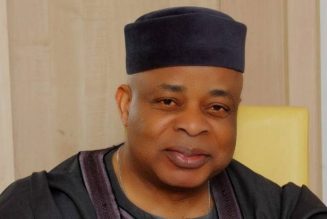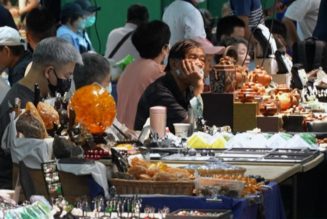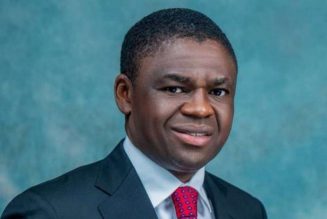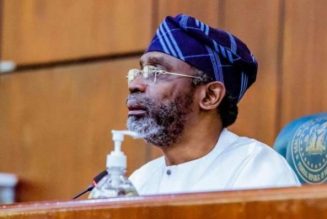
This week on The Trip podcast: Drinking baijiu with Tom Tillotson in Dixville Notch, New Hampshire.
At the stroke of midnight in the high mountains near the Canadian border, in a lodge on the property of the abandoned Balsams Resort, there’s a table covered with red-white-and-blue bunting, a podium, two closet-sized voting booths. Five voters, 30 journalists, four TV trucks, two cakes celebrating the 60th anniversary of the midnight voting at Dixville Notch, NH.
Now, you may think this a departure from our usual subjects. But for me, the performative small-town democracy of New Hampshire’s primaries has always been the stuff of drinking podcasts. Photographer Shane Carpenter and I were first dragged up here to Dixville Notch 16 years ago by a hard-drinking fringe presidential candidate named Dick Bosa, the former mayor of Berlin, NH. Mayor Bosa was behind on child support and dying of cancer while he ran angrily for president, and he drove that night like a man with little to live for, shotgunning beers at the wheel, careening through the north country with Shane and I white-knuckled in the car next to him. When he opened the driver’s side door in the grand driveway of the Balsams Resort, empty beer cans tumbled out clanging on the asphalt. He was on the presidential ballot that night, but he had one major obstacle: every voter was actually a resort employee, and Bosa had a long history of treating the help very poorly. Just after Bosa tossed his car keys at a valet, one of the employees took me aside and said, “You know if he was nicer to us, somebody might actually vote for him.”
I was hooked. I actually appreciated Dick Bosa, he was so raw and on-edge, and yet he was on the ballot just like a Boston brahmin like John Kerry was. Shane and I have been back to New Hampshire every four years since, always following the lesser-known candidates, the dreamers and schemers who try like hell to grab votes from the people you’ve actually heard of. And we went back this year as well. Over the next four episodes I’ll be talking with New Hampshirites, powerful and not so powerful, about their state and their first-in-the-nation primary.
Tonight we start with Tom Tillotson, whose famous father began this midnight voting tradition six decades ago. We drank from, of all things, a beautiful clay bottle of Chinese Baijiu, and toasted to the infinite cranky wonders of American democracy.
Here is an edited and condensed transcript from my conversation with Farrah. Subscribers can listen to the full episode here. If you’re not on Luminary yet, subscribe and listen (and get a 7-day free trial) by signing up here.
Nathan Thornburgh: We should we a toast to Dixville Notch and the midnight vote. Gānbēi.
Tom Tillotson: Gānbēi.
Nathan Thornburgh: What is The Balsams, for those who don’t know?
Tom Tillotson: First of all, to understand the Balsams, you need to understand Dixville Notch. Dixville Notch is physically a notch in—for any west coast listeners who might call them passes—where you can travel east to west in the mountains. So, Snoqualmie Notch, Donner Notch. That’s what it would be on the west coast. But here, Dixville Notch is a small place with a lake on top of a mountain. That’s the notch, the east-west road at this part of the state.
Around 150 years ago, and some people had the idea to start an inn here. It grew organically for 30, 40 years. And then about one hundred years ago, a gentleman by the name of Henry Hale decided he liked it and he was going to invest his fortune here, building it into what would then be considered a world-class resort. We’re in the Hale House right now. This was his private residence. He took this small operation and put in a canal, including a tunnel through a mountain to bring water into building the lakes in here. There wasn’t a lake before him.
Thornburgh: When did your father get involved? He came and bought it at some point from Hale.
Tillotson: Henry Hale bowed out fairly soon, not that long after the stock market crash. It went through a series of owners after Hale left passed away, and his family was still here, but the hotel took on different lives under different ownerships. And that continued for three or four different owners, until the 1950s, when the world changed. These old hotels were built on the premise that rich people from the cities would want to come spend their summers up in the mountains, just taking in the good air. That was the tradition the New England inns were all built on. After the war, the highway system was built, and the American public just changed.
Instead of these long vacations types for the wealthy, the business model became motels and things that you could do on the highway for the growing middle-class that was looking for something different. We’re not exactly on the beaten path. So the hotel was having tough times after the war. The owner that had it was failing and it was up for a tax auction. My father was born 18 miles from here and to him when he was growing up, this was the place where the rich people came, who had no interest in the local people at all, either employing them or having them as guests. And so he had bit of a chip on his shoulder for the property, and this was a chance for him to arrive back in the elite.
Was midnight voting a marketing ploy? Was it, active inspired democracy? Was it both?
Thornburgh: The reason I’ve been here three times in my life as a very post-war American is because of the midnight voting, which has become this kind of great tradition of very, very lower case “D” democracy, with small groups for a midnight vote for the first-in-the-nation primary. It started with your father back when Nixon ran. Was it a marketing ploy? Was it, active inspired democracy? Was it both?
Tillotson: Much more humble than that. He bought the hotel in 1954. His business partner ran it for a while and then he ran out of steam. He was elderly by that time and he had lung cancer. So dad decided he needed to move back here and started living here. The 1960 elections were coming up and he realized that if he wanted to vote, he was going to have to drive an hour down to Berlin or someplace. As the story goes, he at some point in this thinking process met up with a wire service reporter for the Associated Press. And the reporter told him about the midnight voting tradition, which had been going on since the 1930s in the various towns, and my father thought it was a good idea—I can vote right here in my house. And we had all the facilities that made it easier for the press to work here, and phones in all the rooms. So that got it started, and it’s continued for 60 years.
Thornburgh: It’s safe to say that this time you’ve had to fight harder than ever to have it actually happen this evening. The fact that it’s happening as a triumph. Because the hotel is shut down, you’re in a redevelopment phase. It brings up questions like, who’s here to vote and how do you get a quorum? How did you make it work this time?
Tillotson: Last fall, one of the voters that was living here working on the development project decided he wanted to travel, he told us that he was going to go to South America to live for a while, and that doesn’t quite work with the voting. So he resigned as a Dixville voter, and that brought us down to four people. We talked with the Attorney General’s office, and there needs to be a minimum number of election officials. The rules and laws governing that are somewhat Byzantine, but they said we had to find one more person if we wanted to hold it. That was November of last year. And the developer here, who had bought property here and had always planned on moving here when the project was done, I suggested to him that he might want to move up his time schedule, and he did. So here we are. He is the fifth voter.
We’ve been all over the board in terms of being right and being wrong. Whatever happens here tonight is not going to determine the election.
Thornburgh: Why is it important to you to have this midnight voting here?
Tillotson: The midnight voting is important in itself for the state. Midnight voting becomes the starting gun for the whole presidential election process. And what’s a race without a starting gun? And it something early in the morning that tells people that, you know, here’s a bunch of people up in the mountains that had gotten out of bed at midnight to vote, and you folks down in Manchester, all you gotta do is drive your car two blocks and you can vote too. It gets the message out that our democracy depends on participation.
Thornburgh: How seriously should people take the results that come out from the five votes, in terms of it being a bellwether?
Tillotson: Not at all.
Thornburgh: It’s just the act of doing it?
Tillotson: It’s the starting gun. It’s the act. It’s the hundred percent participation. Those are the important messages. We’ve been all over the board in terms of being right and being wrong. Whatever happens here tonight is not going to determine the election.
Thornburgh: The hundred percent participation is absolutely mandatory. You’ve had to haul people drunk and get them sobered up and come out and vote in the past.
Tillotson: Unfortunately, that’s true.
Tillotson: This Baijiu was so good that I think we need to have at least one more little sip.
Thornburgh: I am so with you on that. I vote yes and a hundred percent participation. Cheers to you, Tom Tillotson.
